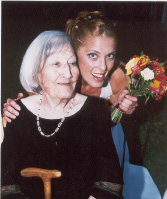
Yael Shaked Aben-Zurwith with her grandmother
Yesterday we buried you amid cloudbursts, gusts of wind and flashes of sunshine. A vivid rainbow arched above your grave as we took our leave of you.
Today I look back at the development of our special friendship. It is almost ten years since I gave up my employment as a secretary and was floundering without a framework for my days. I tried volunteering but most of the assignments seemed beyond me. I couldn’t cope with sick children. I was not even capable of working in the hospital shop, being unable to master the till and be friendly to the shoppers.
Your daughter suggested I spend time with you, then in your eighties and often lonely. I seized on the idea, desperate for a lifebuoy to cling onto. In the beginning you were a reason to get out of bed, a place to go. I felt important and useful, caring for an elderly woman. However, if truth were told, I never had to take care of you. You were fiercely independent. During the early days I sometimes took you for a gentle walk. Soon, however, I was unable to persuade you to leave the apartment. Your knees were so painful that you preferred to stay at home.
All I did was make the coffee, sometimes prepare a sandwich. You rarely asked for any other attention. Although in recent years you had extreme difficulty getting up from the sofa you always asked me several times as I made the coffee, if I needed help. This would annoy me somewhat, as well as your habit of offering me, again and again, another coffee/sandwich/chocolate/ whatever. But this was your loving, giving nature, and the effect of aging. I shouldn’t have been irritated. I loved to bring you your favorite burekas and to see you eat with such enjoyment what you called ‘soul food’. You always worried about the price of this treat and berated me for spending my money.
As time went by my life became very full. I no longer needed my visit to you as a prop. I often had to make time for it but I rarely missed my morning with you. You were always the most important. I had started to write and realized that you had a story that needed to be told and that you wanted me to tell it. Despite the loss of your whole family in Poland, you believed that God guided your footsteps. You felt that towards the end of your life He had sent you someone who could write your story.
We worried about each other as your history unfolded. You were concerned that it would be too harrowing and sad for me and I didn’t know what effect it would have on you, returning to your horrendous past. I feared that, psychologically, it might be harmful. We took it slowly, often passing on to another subject when there was too much emotion. Although at that period I found it difficult to concentrate when someone was speaking, I was completely focused as you told me your story. I felt as if I was there.
How excited you were when my short poem ‘Portrait of Rivka’ was published. As we progressed with the work I entitled ‘The Survivor from Stolpci,’ I realized I couldn’t do justice to your experience in a short story yet hadn’t the know-how to write a full-length book. It finally took the shape of a narrative poem.
On your 88th birthday your great-niece gave a lunch party for you in her home. You always said that you were a feminist and that you enjoyed only the company of women. You compiled the guest list and we were ten women of three generations. All were family members, including, of course, your daughter and your granddaughter. I was the only outsider and you introduced me as your special friend. You sat next to me and insisted that I was served first.
In between the courses of a fabulous meal, the women sang Yiddish songs with great gusto. You remarked to me that Yiddish songs were full of hope and joy and humor. You loved the ballads and sang along in a strong voice. The matrons got up and danced wildly in the middle of the meal, all the while singing the somehow familiar tunes. Although you had been unwell for several weeks you had a wonderful birthday. It was obvious how much everyone loved you and wanted to make you happy.
In the months after the birthday party you were depressed. You would say you had no desire to go on living and sometimes spent most of the day in bed and put off my visits until you were ‘feeling more cheerful.’
Then a date was set for the wedding of your only granddaughter. That gave you a new lease on life. You took an interest in all the arrangements, gave orders as to what you intended to wear and had all of us searching for the ideal sandals for your poor swollen feet. You were more vivacious and humorous than I had ever seen you, yet despite that, you told me that you were crying half the night for no reason. Perhaps the excitement of your granddaughter’s wedding engendered painful emotions about your little girl who did not even live to go to school, let alone to wed.
You asked me to sit next to you during the ceremony. You held my hand tightly
and tears streamed down your face. I can only imagine what was going on in your mind. I was born after the Holocaust, yet I always think of it at a wedding ceremony.
A young couple taking their vows under Israel’s skies is a triumph but they must stand in for so many.
As the rose petals fluttered down I realized that this was closure for ‘The Survivor from Stolpci.’ I wrote the last stanza:
Shadowy figures stand under the awning,
unbeknown to the bride,
now sanctified by her beloved
after the faith of Moses and Israel.
I live to share the triumph
of a granddaughter wed
beneath these skies.
Rose petals flutter to the ground
and tears wet my wrinkled cheeks
as past and future merge
in an old woman’s heart.
I dated the original draft June 12, 2003, the date of the wedding. Even if the poem is never published, I thought, it would be a special gift for the bride and her family.
As you approached 90 there was a gradual decline in your condition. You became frail and seemed to me further diminished at every visit. However, I often wondered at the clarity of your mind, at details you remembered from previous talks. You always asked to hear my latest poem and story and listened with great concentration. I would work out an oral translation into Hebrew of my piece on the bus on my way to you.
No one in my life has ever admired me like you did. You would praise every detail of my dress, although you’d seen the garment a hundred times before, comment on my hair, even my manicure. You had great faith in me. You were convinced I would become a great writer, and told me so several times at each of our meetings. I knew you were not a literary critic but your unfailing belief in me always gave me a boost of confidence. In your eyes, I could do no wrong and I felt a great fondness towards you, like a daughter.
When I first saw you in the hospital, dozing on the pillows, I realized all at once how old you really were. You were connected to a drip and a catheter, and looked so wrinkled and fragile. You opened your eyes and said weakly but with joy: “My Katrin!” Always the gracious hostess you asked me if I would like to make myself a cup of coffee. You’d like one too. Aunt Shoshana had provided the biscuits, you said. I hurried down to the cafeteria on the ground floor to buy your favorite cappuccino.
You slept most of my visit, murmuring from time to time, “Mama, Mama, help me.”
I felt as if I knew your mother, the strong woman who raised you and your siblings after your father died so young. I can see her running the guesthouse and the patisserie with a strong hand and hear her telling you tenderly that God never sleeps. Ailing, yet full of courage, I imagine her throwing her coat over your shoulders as you fled the ghetto, bidding you ‘Go with God.’
I saw you for the last time in the old people’s home. You looked at me blankly and asked who I was. When I said my name, your face lit up. “Katzele,” you said.
You took my hand and said: “I love you so much, and the Jungele.” You always had a soft spot for my son. Those were the last words I heard you say.
You slept. I looked at you as if I’d never see you again. Your face was so small. You’d had a haircut. I’d seen you wearing that black sweater at home. Your breathing was shallow. Your poor hand, bruised black from the infusion needles, clasped mine. I felt peaceful. I didn’t wish I were somewhere else. I sat for maybe half an hour by your bedside, then kissed you and walked away. When your daughter phoned a few days later to let me know you had gone into hospital and the end was near, I said that we had already said our goodbyes.
You told me that you always prayed for my family, especially for my son, when you lit the Shabbat candles. I prayed for you, this week, over the candles, that you have an easy passage and don’t suffer.
At your funeral I read from ‘The Survivor from Stolpci.” It would have pleased you. I chose the verse before last, upon which I built the poem. I always felt it epitomized you and all you told me about your life.
I ask myself why I survived when
all those dear to me perished in the flames.
I know only that I wanted so to live
and in my heart I sensed divine guidance:
He opened the ghetto gates and sent me forth;
nestled me unseen in leafy forests
and surrounded me with fearless fighters.
Roots from the frozen ground nourished me;
even my thirst He quenched with rainwater
in the ruts left by passing trucks.
He set my feet on the path to freedom.
I miss you, dear friend. No one can ever take your place. You were so full of wisdom, compassion and humor. I feel blessed to have had you in my life.
 DEAR EDITOR 155
DEAR EDITOR 155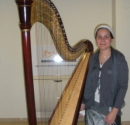 MODIIN ON THE MOVE
MODIIN ON THE MOVE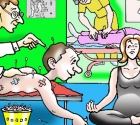 HEALTH HINTS ONIONS FOR JAUNDICE
HEALTH HINTS ONIONS FOR JAUNDICE Reaching Beyond….THE VIEW FROM 50+
Reaching Beyond….THE VIEW FROM 50+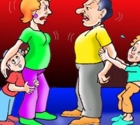 Collaborative Divorce: A process that puts the family first
Collaborative Divorce: A process that puts the family first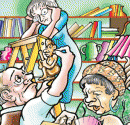 THE MOVE
THE MOVE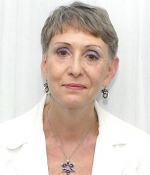 Katherine (Kaila) Shabat
Katherine (Kaila) Shabat